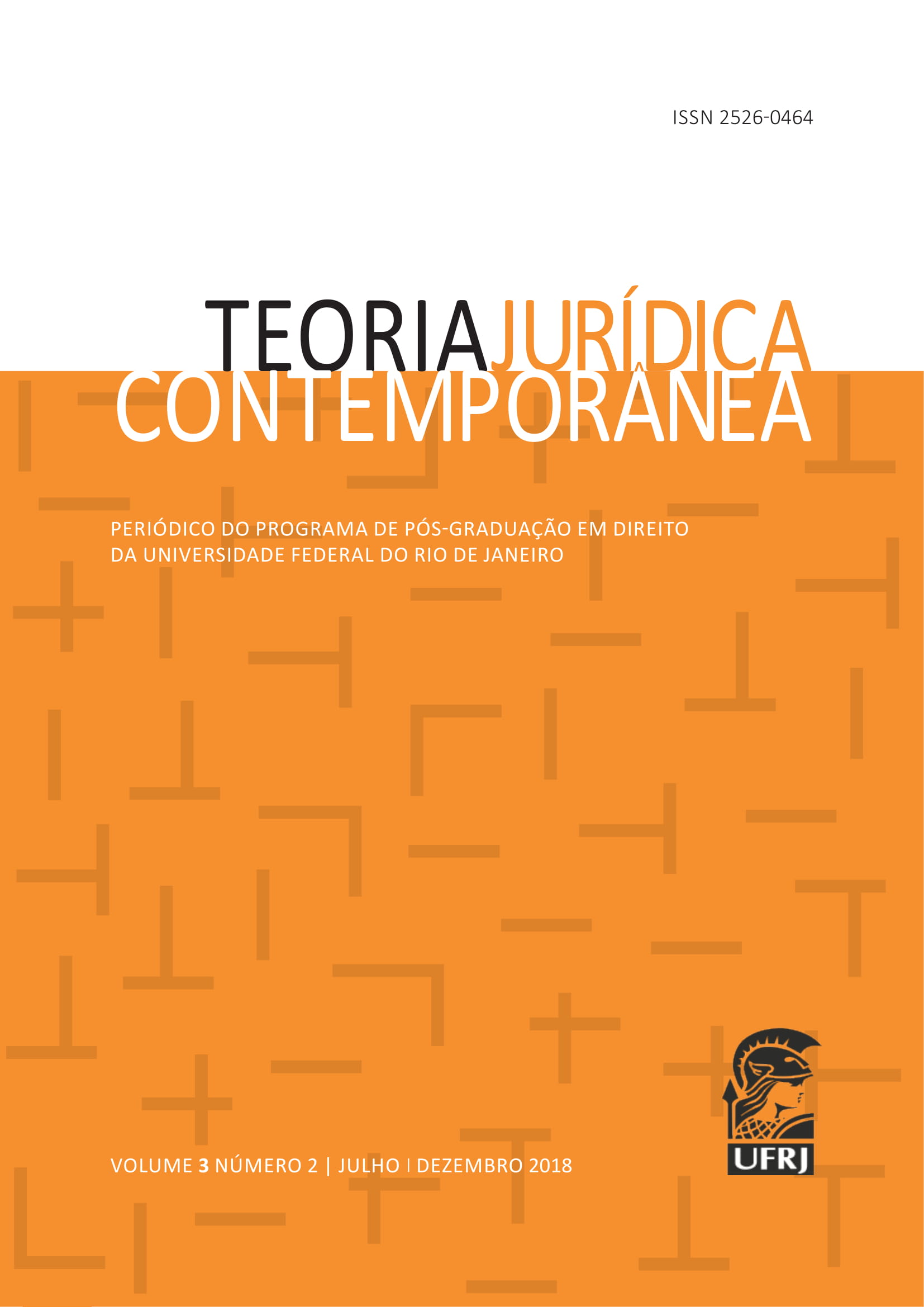Cinco desafios para uma teoria do direito
DOI:
https://doi.org/10.21875/tjc.v3i2.19655Palabras clave:
Grounding, Superveniência, Direito como fatoResumen
RESUMO:
Neste artigo, enuncio cinco desafios intuitivos a serem enfrentados por uma teoria do direito. Na sequência, argumento que a ideia tipicamente positivista de que as atribuições jurídicas possam estar assentadas exclusivamente em fatos descritivos parece conflitar com três deles. Concluo, assim, que a despeito de tanto o interpretativismo quanto o descritivismo serem nalguma medida teorias contraintuitivas, é sobre o segundo que recai um maior ônus argumentativo.
ABSTRACT:
In this paper, I introduce five intuitive challenges that should be dealt with by theories of law. Then, I argue that the typically positivist idea that the legal ascriptions of a given legal system may be grounded exclusively on descriptive facts seems to conflict with three of those challenges. I conclude that in spite of the fact that both interpretivism and descriptivism are counterintuitive theories about law, it is the latter that has a greater argumentative burden.
Citas
BENNETT, K. Making Things Up. Oxford: Oxford University Press, 2017.
BROZEK, B.; ROTOLO, A.; STELMACH, J. (ed.). Supervenience and Normativity. Switzerland: Springer, 2017. DICKSON, J. Evaluation and Legal Theory. Oxford: Hart, 2001.
DWORKIN, R. Law’s Empire. Cambridge, MA: The Belknap Press of Harvard University Press, 1986.
GREENBERG, M. How facts make law. Legal Theory, Cambrige, n. 10, 2004, p. 157–98.
JACKSON, F. From Metaphysics to Ethics: A Defense of Conceptual Analysis. New York: Oxford University Press, 1998.
JACKSON, F. 2017. In Defense of Reductionism in Ethics. In: SINGER, P. (ed.). Does Anything Really Matter? Essays on Parfit on Objectivity. Oxford: Oxford University Press, 2017, p. 195–211.
HART, H. L. A. The Concept of Law. Oxford: Clarendon Press, 1994.
KIM, J. Postscripts on Supervenience. In Supervenience and Mind: Selected Philosophical Essays. Cambridge: Cambridge University Press, 1993, p. 161-171.
LIMA, F. On the-Law Property Ascriptions to the Facts. Ratio Juris: An International Journal of Jurisprudence and Philosophy of Law, v. 31, n. 2, 2018, p. 231-50.
PLUNKET, D. A Positive Route For Explaining How Facts Make Law. Legal Theory, n.18, 2012, p. 139-207.
RAZ, J. Kelsen’s Theory of the Basic Norm. American Journal of Jurisprudence, v.19, n. 1, 1974, p. 94-111.
RAZ, J. Between Authority and Interpretation: On the Theory of Law and Practical Reason. Oxford: Oxford University Press, 2009.
ROSEN, G. Metaphysical Dependence: Grounding and Reduction. In: HALE, B. HOFFMAN, A (ed.). Modality: Metaphysics, Logic, and Epistemology. New York: Oxford University Press, 2010, p.109-136.
SCHAUER, F. Law as a Malleable Artifact. In: BURAZIN, L. HIMMA. K. ROVERSI. C (ed.). Law as an Artifact. Oxford: Oxford university Press, 2018, p. 29-43.
SHAPIRO, S. J. The “Hart-Dworkin” Debate: A Short Guide for the Perplexed. University of Michigan Public Law and Legal Theory Working Paper, n. 77, 2007. Disponível em: https://doi. org/10.2139/ssrn.968657.
SHAPIRO, S. J. What Is Law (and Why Should We Care)? In: Legality. Cambridge, MA: The Belknap Press, 2011.
TAMANAHA, B. Necessary and Universal Truths about Law? Ratio Juris: An International Journal of Jurisprudence and Philosophy of Law, v. 30, n. 1, 2017, p. 3-24.
TROGDON, K. An Introduction to Grounding. In: Varieties of Dependence. In: HOELTJE, M., SCHNIEDER, B. STEINBERG, A. (ed.). Philosophia Verlag, 2013, p. 97-122.
Descargas
Publicado
Número
Sección
Licencia
Los autores que publican en esta revista están de acuerdo con las siguientes condiciones:
- Los autores mantienen los derechos de autor y conceden a la revista el derecho de primera publicación, estando el trabajo simultáneamente bajo la Licencia de Atribución de Creative Commons que permite compartir el trabajo con el reconocimiento de la autoría y la publicación inicial en esta revista.
- Los autores pueden asumir contratos adicionales por separado, para la distribución no exclusiva de la versión del trabajo publicada en esta revista (por ejemplo, publicando en un repositorio institucional o como capítulo de un libro), con el reconocimiento de la autoría y la publicación inicial en esta revista.
- Se permite y se anima a los autores a publicar y distribuir su trabajo en línea (por ejemplo, en repositorios institucionales o como página personal) en cualquier momento antes o durante el proceso editorial, ya que esto puede generar cambios productivos, así como aumentar el impacto y la citación del trabajo publicado (Véase El efecto del acceso abierto).

Esta obra está bajo una licencia de Creative Commons Attribution-ShareAlike 3.0 Brasil.

